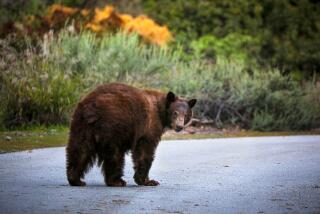Big game hunters should spare animals and go after poachers
- Share via
If American big game hunters are desperate for a boost to their testosterone-driven egos, they should stop shooting lions and elephants and rhinos and start stalking a species that the world has in abundance: venal human beings.
Imagine the thrill they could get from tramping through the jungle and over the Serengeti to hunt down the poachers who have killed off all but a few of the black rhinoceroses and are fast closing in on the last African elephant. Of course, the poachers are well-armed too, but that would make it a fairer fight than the hunters usually allow the four-footed animals that get drawn into their sites by well-paid trackers.
As anyone knows who hasn’t been in a coma for the last week, a Minnesota dentist named Walter James Palmer has been feeling the wrath of a vast host of shunners and shamers on the Internet after it was reported that he killed a lion that his guides illegally lured out of a national park in Zimbabwe. The lion had a name — Cecil — and was the key animal in an ongoing scientific study. Now, the dentist is being sought for extradition by Zimbabwean authorities. He has had to shut down his dental practice and has gone into hiding, but Palmer is getting little sympathy, other than from Rush Limbaugh and other right wingers who are portraying him as a victim of oppressive political correctness.
Joining Palmer in public scrutiny this week is a Pennsylvania oncologist, Jan Casimir Seski, who stands accused of illegally killing a lion in Zimbabwe last April. Photos have surfaced of Seski standing next to various other animals he has killed for sport, including at least six elephants, a hippo and an undoubtedly ferocious ostrich. Seski lives on an expanse of rural acreage dotted with “no trespassing” signs. Neighbors say they have observed him wandering his land wearing a low-slung holstered gun in the manner of an Old West gunfighter. This tough guy is now hiding from reporters.
One more big game hunter who has gotten negative attention is Texan Corey Knowlton, who paid $350,000 at an auction for a license to shoot a black rhinoceros in Namibia. Knowlton received death threats before the hunt in May when he killed an older rhino that Namibian officials say needed to be culled before he harmed younger members of his species. The Namibian government allows the killing of five aging rhinos a year as a means of funding anti-poaching efforts and conservation programs.
“I think people have a problem just with the fact that I like to hunt,” Knowlton said after taking down the rhino. “I want to see the black rhino as abundant as it can be. I believe in the survival of the species.”
That is certainly a worthy sentiment, and defenders of big game hunters point to the fact that many high-dollar hunts do fund programs to protect the animals that remain. The problem is that the money raised is just a drop in the bucket compared with what may be needed to fight the poachers and the traders who market rhino horns and elephant tusks to Asia. According to the World Wildlife Federation, the number of black rhinos in Africa dropped by 96% between 1970 and 1992, and the decline has continued in subsequent years. At the rate that African elephants are being illegally slaughtered, they will nearly all be gone within a decade. Lions are not doomed yet, but their numbers are dwindling.
That is why so many people react so negatively to reports of rich Americans going on expensive safaris in Africa to kill these animals for the fun of it. Yes, hunters can justify it to themselves by saying some of their money may go into a conservation fund, but the symbolism is terrible.
That is why, with tongue only half way in cheek, I suggest their shooting skills might be better exercised in the hunt for the creeps who have decimated the herds of these magnificent and irreplaceable animals merely to feed a lucrative market driven by human stupidity and greed.
More to Read
A cure for the common opinion
Get thought-provoking perspectives with our weekly newsletter.
You may occasionally receive promotional content from the Los Angeles Times.










